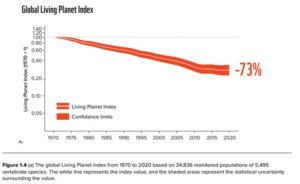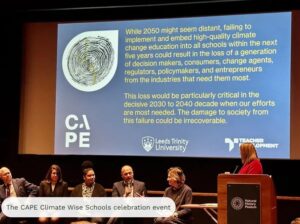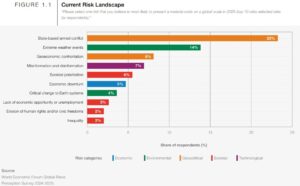Website – UKSSN Operations Group
LinkedIn – (3) UK Schools Sustainability Network Operations Group | Groups | LinkedIn
“We are currently losing species at a faster rate than in any of Earth’s past extinction events. It is probable that we are in the first phase of another, more severe mass extinction. We cannot predict the tipping point that will send ecosystems into total collapse, but it is an inevitable outcome if we do not reverse biodiversity loss.” (Dr Yuangeng Huang, China University of Geosciences, journal of Current Biology)
Biodiversity loss is accelerating around the planet, jeopardizing countless ecosystems and species and, with them, the health and livelihoods of billions of people.

Some positive news this week. Last week at COP16 in Rome more than 140 countries adopted a strategy to mobilize hundreds of billions of dollars a year to help reverse dramatic losses in biodiversity. Against a backdrop of foreign aid freezes and cutbacks, nations agreed to a “permanent arrangement” to pay to help developing countries conserve biodiversity and a strategy to “mobilise” at least $200bn per year by 2030. The announcement came shortly after the UK published its plan for how it will “halt and reverse” biodiversity loss this decade. The UK plan sees the UK commit to implementing a lengthy list of global targets within its borders, including protecting 30% of its land and seas, restoring 30% of degraded ecosystems, and halving the risk from pesticides by 2030.
Global biodiversity agreement mobilises $200 billion boost for nature | UN News
It is hoped that the hard-won decisions made by parties to the UN Convention on Biological Diversity will shore up biodiversity and fragile ecosystems which are bearing the brunt of increased conflict, deforestation, mining, toxic waste dumping and other environmental impacts worldwide.
This week from UKSSN Ops Group –
- Funding: Survey (a call for information)
- UK Nationally Determined Contribution: A leap for Climate Education
- Nature: National Education Nature Park update
- Nature: Tree planting
- Estates: Digitisation
- Careers: the Green economy
- Volunteering: Climate Ambassadors
- CPD Offers
- Celebrating sustainability: Sustainability Awards 🥳
- Communication: Greenhushing
- And finally…
- Plus: Advice and Support
💰Funding: Survey💰
https://forms.office.com/e/RGhGMERPiy
We are keen to understand the proportion of schools and Trusts who are successfully applying for funding to support sustainability. We recognise that for some aspects of climate action there is a financial cost and with so much pressure on school budgets we need to find new sources of revenue to achieve our ambitions. We would be really grateful if you could take a couple of minutes to complete our survey. We will anonymise all responses and share the results with the network and colleagues at DfE later in March. Closing date: Thursday 20th March.
In the meantime, I have attached a summary of funding opportunities available to schools (kindly shared by Central Bedfordshire Council 🙂).
February Funding Opportunities
Plus: Low Carbon Skills Fund: working with organisations to plan their net zero future | Salix Finance
Phase 6 of the Low Carbon Skills Fund is due to be announced soon. Grants are for the public sector to engage specialist advice and skills needed to create robust heat decarbonisation plans. Public sector bodies that were unsuccessful in applying for previous phases of the Low Carbon Skills Fund or are considering future opportunities to develop a heat decarbonisation plan, can find support available to help develop strategy-stage heat decarbonisation plans from local hubs and a number of trusted third-party suppliers.
🎓UK Nationally Determined Contribution: A leap for Climate Education🎓
UK’s 2025 Nationally Determined Contribution: A huge leap for climate education
As part of the Paris Agreements, each nation is required to produce a ‘Nationally Determined Contribution’ outlining how they plan to meet their climate action targets. Teach the Future as published a very helpful blog setting out the impact of our NDC’s on climate education.
🦋Nature: National Education Nature Park🦋
The number of schools working with the National Education Nature Park continues to grow. Below is a summary of some of the work they have been doing. I have the privilege of leading a workshop alongside Dr. Jess Tipton, Head of the National Education Nature Park, at next week’s ASCL Annual Conference. If you are heading to the conference do come and say hello.
Case study: creating a Climate Action Plan at Drake Primary School
Read more
By the beginning of the 2025/26 academic year, every school will need a Climate Action Plan to lead the way in tackling climate change, and the Nature Park can help with this! Drake Primary School have been getting stuck in to create theirs, combining advice and support from the Nature Park, Climate Ambassadors and Let’s go Zero. Discover how they did this, what their next steps are and how you can get started!
Supporting schools in embedding the Nature Park: CAPE’s commitment to high-quality professional development
Over the last few months, we’ve been working with CAPE (Climate Adapted Pathways for Education) to pilot embedding the Nature Park within their existing professional development programme. Heena Dave, Co-Founder of CAPE, shares the story so far and how they are aiming to ensure that the National Education Nature Park is not just an initiative schools engage with but a core part of how children learn about and interact with the natural world around them. Read more

End of term round-up: Wednesday 26 March
Wednesday 26 March, 16.00-16.30: Register here
Join us for another end of term round-up from the National Education Nature Park. Hear from staff and students at Bredon Hill Academy who’ve been working to embed the Nature Park programme in their learning, what the Nature Park scientists have been getting up to with data collected so far and how to get stuck in to mapping out the habitats on your site next term!
🌳Nature: Tree planting🌳
How Much Carbon Does a Tree Capture (24 Species + Calculator)
Trees generally become a net positive for carbon sequestration after several years, typically within the first 10-20 years of growth, depending on the tree species and environmental conditions. Young trees grow rapidly and absorb more carbon dioxide than they release through respiration; however, it can take longer to reach a true net positive, perhaps 20-25 years, depending on factors like soil disturbance during planting.
There are a number of opportunities to obtain high-quality trees and shrubs for your school at no cost. I have listed two below. Councils often have local or regional offers, so it is definitely worth checking in with them too.
Woodland Trust (applications open): Free Trees for Schools and Communities – Woodland Trust
England’s Community Forest: Ravenshall School – England’s Community Forests
Make sure you seek expert advice before planting trees to ensure they have the best chance of surviving and thriving.
🏫Estates: Digitisation🏫
Digitising the School Estate: Unlocking Efficiency Through Data – Barker Associates
Wednesday 19th March, 11.30-12.30
Adaptation and resilience to climate change are critical parts of a comprehensive action plan. Our climate is changing; we need to ensure our buildings can withstand more extreme conditions. Barker Associates are running a workshop they delivered at the recent CST Finance and Operations conference, providing new ideas to manage our estates safely and effectively.
Plus: The Trust Network (TTN) is a free peer support network committed to supporting school estates managers to create and maintain environments that enhance teaching and learning. As a member your trust will have access to a wealth of opportunities for free CPD, sharing best practices, exchanging knowledge, and when needed, uniting to voice concerns with the Department for Education and other national agencies. We will be speaking at the TTN National Conference in April.
💼Careers: the Green economy💼
Spotify
Earlier this week I had the pleasure of being interviewed by students at the City of London School for Girls. Inspired by their school Director of Sustainability, students on their ‘Introduction to Climate Change’ course talk to people in a wide variety of jobs that enable them to take climate action and make the world more sustainable through their work. The podcast is a relatively simple, modern, low-cost and effective way of talking about sustainability and inspiring people to take action.
Plus: Green careers and geography secondary resources
Check out the resources
Help learners explore the variety of green careers available to them through these engaging geography resources developed with the Royal Geographical Society. From apprenticeships to degrees, these resources show how the green skills learners develop through the Nature Park can lead to an exciting career in the future.
💚Volunteering: Climate Ambassadors💚
Climate Ambassador Resources | Trello
The DfE Climate Ambassador programme matches volunteer climate experts with education settings to develop climate action plans in nurseries, schools and colleges. The programme is managed on a regional basis, with local hub managers available to support your school engage an ambassador or support you to become one. Get in touch with your local group, at very least it is a great way to grow your network.
🎓CPD Offers🎓
DfE/ISBL Local Support Offer for Sustainability
Develop your skills across the board with our comprehensive ISBL-aligned training — ISBL
The DfE are funding in-person, practical training sessions focused on technical skills and knowledge, career development and pathways, soft skills and capacity building. One of the eight sessions currently available is focussed on Sustainability. The sessions run for up to 3 hours and are available for up to 30 attendees per session. The training is available to trusts and regional network groups who are interested in facilitating a session for solely their own SBPs and/or colleagues within their region. This is a great opportunity to upskill and engage a group of school business leaders, estates, finance and operations professionals on sustainability and climate action.
If you are interested in finding out more information please email: training@isbl.org.uk.
Let’s Go Zero Carbon Literacy
Free Carbon Literacy training from Let’s Go Zero
Starting 11 March, Let’s Go Zero are running brand new Carbon Literacy training programme which will support school staff members looking to boost their confidence and understanding of climate change and carbon emissions. The course will focus on key topics like recycling, pollution, climate change and how to inspire the next generation to act on environmental issues. You can also contact your local Climate Advisor for support in developing your climate action plan and reducing your emissions. I joined the fabulous Jen Gale earlier this week delivering Carbon Literacy to colleagues working in Bedfordshire schools….an opportunity not to be missed! 💚
Waterwise Water Literacy
Water Literacy | Accredited Learning Experience
Despite the UK’s rain drenched reputation, demand for fresh water increasingly outstrips supply. This creates a state of water scarcity, which has damaging environmental impacts. Despite this, water remains an undervalued, regularly wasted resource. We need a wave of change, and this course will empower you to be a part of it. Water Literacy is a learning experience to inspire, motivate and educate professionals to play their part in addressing the environmental impact of water scarcity in the UK. It’s an informative, accessible and action-orientated course. Through a single day of learning, participants are empowered to embed change at their organisations, at home, and in their communities.
Regional and National events
Conferences and events for climate and nature are great for CPD and building your network. Here are just a few more to look forward to –
- East of England Sustainability in Education Series with updates from DfE in Essex (26th March 2025) and Suffolk (2nd April 2025)
- The Trust Network national conference, Pelsall (23rd April 2025)
- Education Estates Net Zero Conference, LSE London (24th April 2025)
- Schools Sustainability Showcase, ARU Peterborough (22nd May 2025)
- ASCL Annual Sustainability Conference, Manchester (5th June 2025)
PLUS – School Resource Management training (by Entrust) on ‘A Sustainable Estate and Climate Action Plans‘ running in the new year.
🥳Celebrating Sustainability: Sustainability Awards🥳
The Department for Education Sustainability Award is now open for applications (closing date 24th April). The award recognises institutions that have taken innovative, measurable, and impactful steps to embed sustainability within their operations, curriculum, and community. The winning school or college will receive a £2,500 award to further support sustainability initiatives. Awards for sustainability are great for showing other schools and Trusts what can be achieved.
📢Communication: Greenhushing📢
In recent years ‘greenwashing’ – the practice of deceiving the public into thinking an organisation is more environmentally friendly than it actually is – was the big concern. A new trend is emerging, one potentially as damaging to climate action: “greenhushing.”
Greenhushing is the inverse of greenwashing: organisations taking action yet reluctant to talk about their climate efforts. In 2024, 63 out of the 100 largest publicly listed firms in the UK under-promoted their work on environmental protection, according to an analysis by market research firm Connected Impact, which examined the differences between what companies disclosed in public filings and what they presented in promotional materials.
Schools are trusted institutions. We have a fantastic opportunity to talk about climate action, to educate and influence the communities we support. Through websites, newsletters, videos, podcast, policies, events, and most importantly through children and young people, we can spread a message of hope and action to repair our environment. We must take care to avoid the pitfalls of greenwashing yet be bold enough to talk openly about the work we are doing and what we are aiming to achieve.
And finally….an article from Private Eye
As someone far wiser than me once said…”what if climate change is a big hoax and we create a better world for nothing.” (Joel Pett)

Have a great weekend 💚
Sources of advice and support
- DfE sustainability hub: Sustainability Support for Education
- UKSSN: UKSSN Operations Group
- Education Nature Park: Home | Education Nature Park
- Climate Ambassadors: Climate Ambassadors: Turning Climate Ambition into Climate Action in Education | Climate Ambassadors
- Let’s Go Zero: UK Climate Change • Let’s Go Zero
- EAUC: The Platform – Environmental Association for Universities and Colleges, EAUC – United Kingdom
- FED: FED | Climate Change
- Good Estate Management for Schools – Good estate management for schools – Guidance – GOV.UK
- Sustainable Drainage (SUDS) – Susdrain – The community for sustainable drainage
- The Trust Network (TTN) – The Trust Network supporting good school estates & facilities management
References
HM Government Net Zero Strategy (October 2021, page 29)
‘Government is leading the way – embedding climate into our policy and spending decisions, increasing the transparency of our progress on climate goals, and providing funding to drive ambitious emissions reductions in schools and hospitals.’
https://assets.publishing.service.gov.uk/media/6194dfa4d3bf7f0555071b1b/net-zero-strategy-beis.pdf
Department for Education Sustainability and Climate Change Strategy (April 2022)
Sustainability and climate change strategy – GOV.UK
Streamlined Energy and Carbon Reporting (SECR)
Environmental reporting guidelines: including Streamlined Energy and Carbon Reporting requirements – GOV.UK

